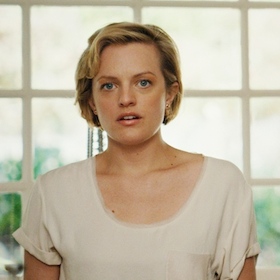'The One I Love': A Surreal Twist On The Romantic Comedy

4.5/5
Director Charlie McDowell and writer Justin Lader embrace the unreality of the romantic comedy and take it to another level with The One I Love. Romantic comedies are a dime a dozen. They’re all bereft of reality and have nothing to say. In The One I Love, a surreal take on modern marriage by way of David Lynch and Andy Kaufman, McDowell and Lader spin the genre on its head. The experimental and largely farcical nature of the film is nearly Shakespearean in its desire to fool both the central couple and the audience.
The concept is quite tried: Ethan (Mark Duplass) and Sophie (Elisabeth Moss) have been married for years but are going through a rough patch — as much to do with their differing personalities as it is to do with Ethan’s recent infidelity. Their therapist (Ted Danson) suggests they go on a retreat together to a cottage he knows. He’s sent couple there before and they all come back feeling reinvigorated and totally in love.
The artfully made trailer to this film promises a surreal twist to what happens to the couple at this retreat, and the promise does deliver. It’s a trope used significantly in sci-fi and certain metaphysical stories, but is well adapted to this character piece that asks larger questions. The trope is something I will not spoil here, though you can guess it fairly easily from the trailer, not to mention the fact that the film’s poster is pretty direct in revealing it.
Despite it surreality, The One I Love has a primary theme that is grounded in truth: the expectations in relationships. Ethan tolerates Sophie’s dislike of bacon (he should have left her immediately) and her passive aggressive tactics; Sophie tolerates Ethan’s interrogatory personality and his lack romance. Together, they are both incredibly bored of each other and attempts at rekindling the affection they once shared by replaying important moments in their relationship results only in staring blankly at the floor to ceiling windows of a stranger’s home. The line about being unable to go back home is taken literally here. Separately, Sophie and Ethan take to the cottage’s guesthouse where they confront their own ideas of a perfect mate.
For Sophie, the idealized Ethan is earthy and artsy — his hair is unkempt and he no longer wears glasses; he’s more emotionally available and nearly psychic in his ability to predict and interpret Sophie’s needs and desires. For Ethan, there is certainly more bacon from his idealized Sophie. She keeps him on a longer leash and doesn’t require as much recognition. Where they overlap is that both of them would like a more submissive partner.
Duplass and Moss have the unenviable task of essentially playing things broadly. Depending on the needs of the scene, they must have either no chemistry together or a ton of chemistry; they also have to act against themselves, which is hard for any actor. The pair play their roles to earnest perfection, though Moss is probably more of the standout. She is a master of subtlety, and conveys so much just through the slightest twitch or eye movement.
I need to make special mention of Charlie McDowell. A director needs to make his story visually arresting which can be easy to do when your cast is large and boasts use of green screens and various sets. McDowell had none of that. He had two actors (three if you count Ted Danson’s cameo) and two sets (one of which is a redress of the first set). McDowell keeps from using the same shots and angles, and, through his actors, manages to carefully thread the truths of their identities very carefully, yet clearly. While the script can be repetitive near the middle (about four minutes could have been shaved from the final version), McDowell never lets the visual palette repeat itself.
The film moves on and slowly the colors become more muted, and the music underlines the darker and more sinister undercurrent that exists beneath the surface. Eventually, even the perfected versions of Ethan and Sophie can’t keep it together either — declaring, subtextually, the nature of all relationships. There is a selfishness to all relationships. One partner will always love the other more, and even in perfection there is betrayal and boredom. It says a lot about us that even when confronted by a living idealized partner, we still manage to be unfulfilled. There’s an indictment of monogamy implicit here, and in the last scene the message comes home clearly: you do the best you can with the limited options available. (This really isn’t a first date movie.)
The sometimes repetitive scenes scream of a lack of refinement in the script (a great deal of it was improvised on the spot by Duplass, Moss and McDowell). The lack of a strong script is also damaging to the sci-fi conceit that impels the story forward. It doesn’t quite make complete use of its concept, and the vagaries of how and why are essentially ignored. This will likely polarize audiences — the same groups that fought over the Sopranos ending will mostly likely fight each other again. But while the gangster series did in fact imbue enough clues and subtext to reveal everything after the screen turned black, The One I Love decides to answer the question with a shrug from Ethan, “Does it really matter?”
RELATED ARTICLES
Get the most-revealing celebrity conversations with the uInterview podcast!







Leave a comment